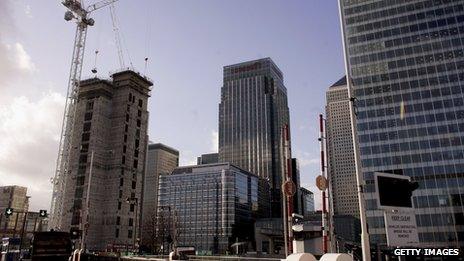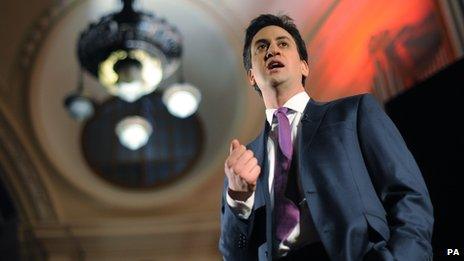How to break up banks
- Published
- comments

The Labour leader's plan to ask the new Competition and Markets Authority (CMA) to investigate whether there is adequate competition between the UK's big banks is a pretty alarming prospect for those banks.
They will wonder whether there will ever again be a time when they are not being crawled all over and under by assorted regulators, investigators and commissioners.
Just in the opening years of this parliament they have been probed in a comprehensive sense by an Independent Commission on Banking and a Parliamentary Commission on Banking Standards, and in a narrower way by the defunct Financial Services Authority, the Serious Fraud Office, the Financial Conduct Authority (FCA), the Prudential Regulation Authority and assorted official bodies all over the world (almost too many of them to mention).
It is no longer appropriate to say that business as usual for banks is prevented by all the uncertainty - about their respective structures or cultures or size - created by the assorted investigations. Business as usual for banks is to be permanently under investigation, and will remain that way for years.
That is a price they have paid for their sins in the boom years, and their leading role in the 2008 financial calamity that hobbled all the leading western economies.
Of course it is a price that we pay too, in bank share prices that may be a bit lower than would otherwise be the case (we own the semi-nationalised banks as taxpayers, the others through our pension schemes).
But, interestingly, customers do not appear to be picking up any kind of bill, or at least not yet. Arguably all this scrutiny has forced the banks to be a little more assiduous when it comes to customer service, and less ready to rip us off when we're not looking.
So what should any review of the banks by the soon-to-be created new super competition regulator focus on?
Well, although it is a bit embarrassing for Ed Miliband that the governor of the Bank of England, Mark Carney, voiced scepticism yesterday that competition would be significantly enhanced by breaking banks up or forcing them to slim down, he would never claim to be a competition expert.

The Labour leader, Ed Miliband
So although his writ runs more or less everywhere in the financial world and economy, perhaps on this he should not be seen as the oracle.
As the Independent Commission on Banking said in its final report, it would be legitimate by 2015 to examine whether the divestiture of TSB by Lloyds has created a strong new competitor, whether it has become significantly easier to switch banks and whether the FCA is "demonstrating progress to improve transparency and reduce barriers to entry and growth by rivals to incumbent banks".
But there is one important issue about the structure of banks which is both fundamentally important and has been largely ignored in recent years - which is whether the biggest barrier to proper competition in banking is the big banks' ownership of the payments system.
Funnily enough, it was an investigation by the last Labour government some 15 years ago - commissioned by Gordon Brown and carried out by Don Cruickshank - which characterised the payments system as a utility that ought to be regulated in a formal and intrusive way on a permanent basis.
Cruickshank recommended that a specialist regulator should be created to set the price for using the payments system to ensure that all banks had equal access to it on non-discriminatory terms.
The government said it agreed with him, and then - over a period of many years, after further reviews and consultations - did very little about it.
When I talk to those running banks big and small, they say that the competitive playing field could be levelled in a significant way, if the payments system became an independent, price-regulated utility, available to be used on equal terms by all authorised banks, whether big or small.
Or at least they do, when not suffering from a panic attack at the putative logistical challenge and cost of de-merging all the software and hardware and people.
There is another argument for creating a separate regulated payments network - the equivalent for banks of the National Grid - which could be seen to be in the big banks' interests.
The payments system is huge, creaking and inefficient, built on layer after layer of obsolete computer systems, which may never be overhauled as thoroughly as may be necessary, if banks can get away with patching it up.
In an internet world, it looks like a steam engine. A proper regulator might force banks to invest the necessary sums to turn it into a diesel engine, at the least.
Why the need?
Well for me, perhaps the most interesting thing about modish bitcoin - the online money - is that it is perhaps the first monetary system that makes no use at all of banks' transmission systems. Bitcoin, among other things, is a frictionless, costless way of moving money all over the planet.
Bitcoin is an existential challenge to the banks. But that is a story for another day.